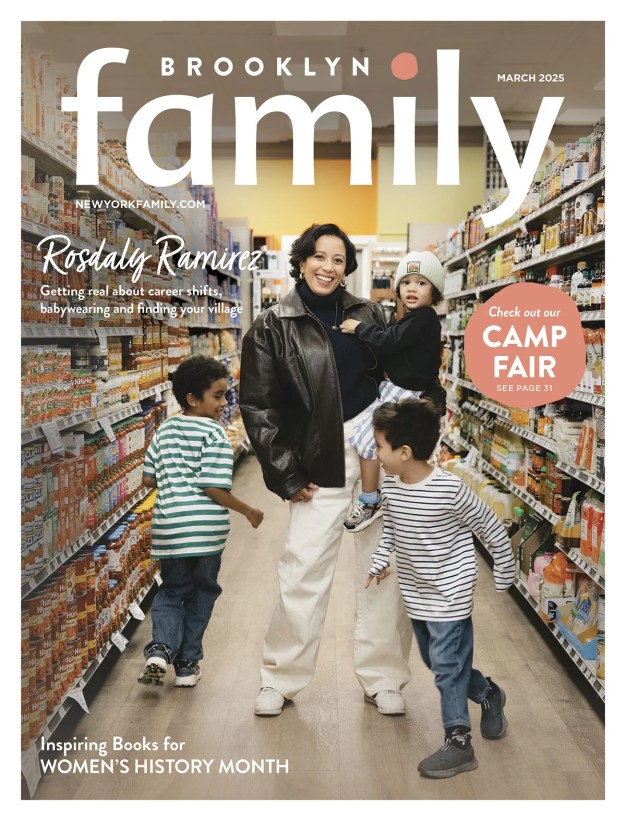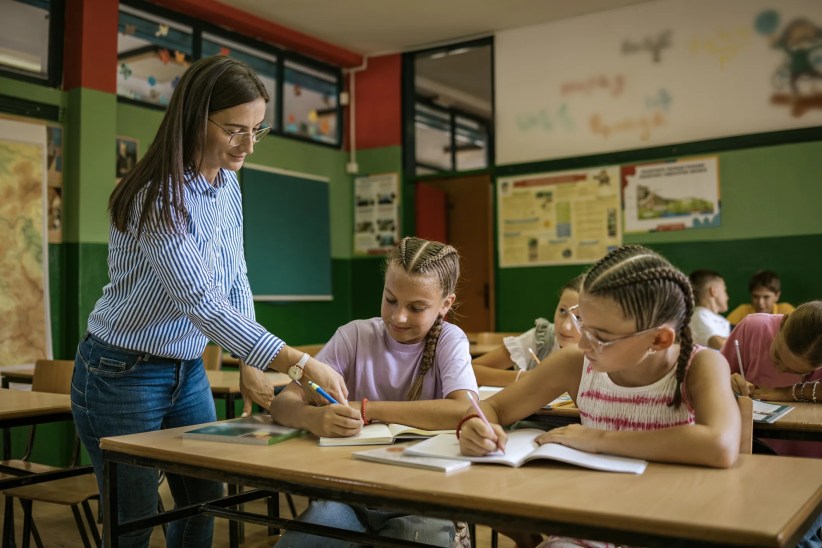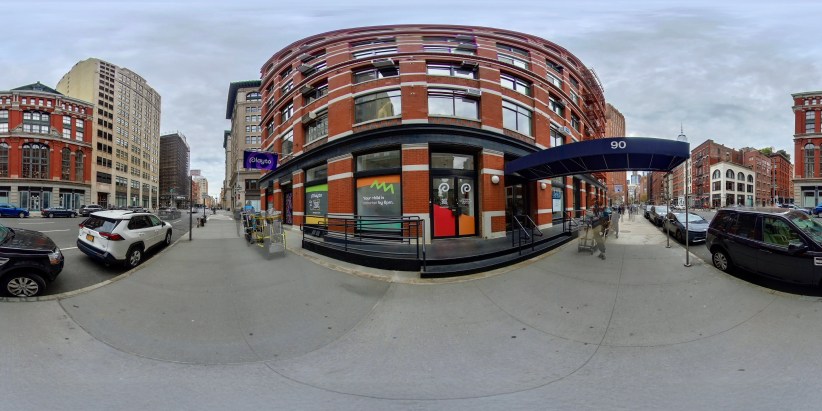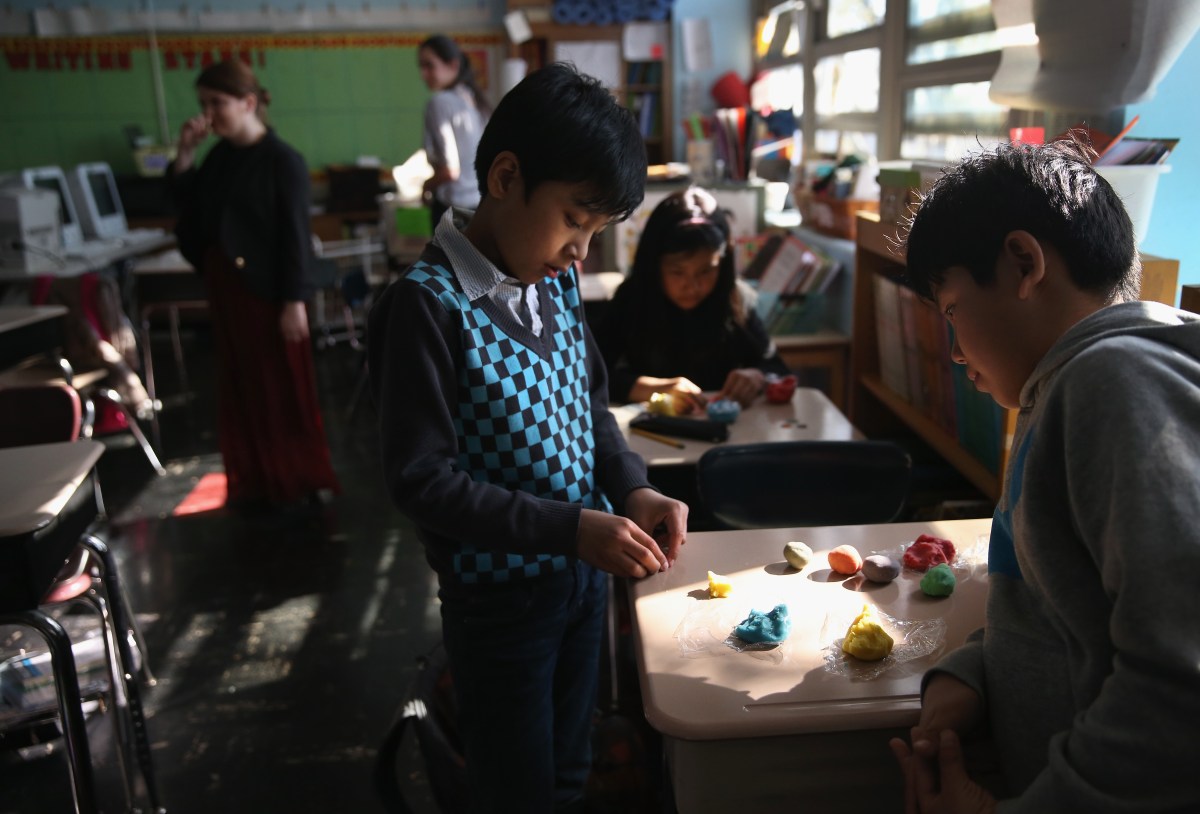 [Editor’s Note: The best way for local parents to plug into all of our education and parenting coverage, giveaways, weekend tips, and more is by signing up for any of our free weekly newsletters. Click HERE sign up. Thanks!]
[Editor’s Note: The best way for local parents to plug into all of our education and parenting coverage, giveaways, weekend tips, and more is by signing up for any of our free weekly newsletters. Click HERE sign up. Thanks!]
Before journalist Amanda Ripley began researching international schooling for a magazine article, she wasn’t entirely convinced that she wanted to write about the topic. “I didn’t say so out loud, but education stories seemed, well, kind of soft,” she admits in the prologue of her book, The Smartest Kids In The World: And How They Got That Way.
But Ripley’s insightful book, accessible to parents and educators alike, is far from the soft journalism she feared. Though the book explores the far away school systems of Finland, South Korea, and Poland, it hits close to home with its observations on why the American education system continues to face major problems. Using American teenagers who are studying abroad in those countries as “amateur anthropologists,” Ripley explores the human element behind the much-discussed PISA (Program for International Student Assessment) results which place American students behind many of their developed world peers. And yet, by better understanding the successful educational approaches of other countries, it is also a book of hope to anyone seeking ideas for improving our schools—and the odds of our children succeeding in a global future.
What first piqued your interest in writing a book on education?
I had written a variety of stories on education in the US, and I kept coming across this research that was showing that a very small number of countries had managed to do what we had not, which was to educate virtually all their kids to high levels of thinking in math, reading, and science…and I didn’t really believe it! If it’s true, that these countries have done the seemingly impossible…how did they do it?
You focused on three American high school students (Kim, Eric, and Tom) as they each spent a year studying abroad in respective countries. How did that come together?
Every year there are about 30,000 teenagers who either come to the US to study or leave the US to [study] abroad, and there are organizations that help arrange those exchange programs. I reached out to some of those and asked for volunteers from the countries that I knew had compelling education stories. I was able to find students who would make good storytellers and [also] who would help me see more clearly, because I’m too old, really, to remember what high school is like… Kids [doing an international exchange] think all day long about what is different between their host country and their home country. They have strong opinions on it, but most of the time nobody asks them.
Had you already chosen to focus on the school systems of Finland, South Korea, and Poland at that point or was that more something that came along with the kids that you chose?
I had [already] zeroed in on those three countries for different reasons. Finland because it’s sort of the utopia, where the kids aren’t overly fixated on testing or tutoring but they are still getting really good results. South Korea because it’s the extreme manifestation of the Asian pressure cooker model where kids are fixated on test results, [are] going to tutoring, and are working incredibly hard. And then, Poland, because they had dramatically improved just in the recent past…and they had a high level of child poverty, about 16 percent… In some ways Poland was more comparable to the US, [or] at least individual states.
When you first began researching your book, what were your goals and did they shift as you found out more about other education systems?
[In the beginning], I was hoping I could eject out of the US debates on education. I wanted to do something totally different because when you look at international data, the debates we have seem mostly irrelevant. The main thing that changed though was that following [Kim, Eric, and Tom] turned out to be much more important than I had realized. Honestly, I just thought they would make the book more interesting. I didn’t realize how important it is to listen to kids and what they talk about. Kids talk about other kids… [that’s] the most powerful influence on their day-to-day attitude towards education. So that really helps you remember what it’s like to be in high school and not get swept up into things that are important but not central to real kids’ lives. [Without the kids], I wouldn’t have focused on the rigor as much as I did, or on student drive, or on parents. There were many things that I didn’t expect to be important and they were.
What do you think the pros and cons are of using a system like PISA to compare school systems? Do you think that it is a good barometer?
I did look at other tests, but I ultimately concluded that the PISA is the best measurement that we have at the moment. What I like about it is that it’s really designed to look at kid’s abilities to think for themselves, to make an argument, to solve a problem they’ve never seen before… It’s a measure of what you can do with knowledge… I [took] the PISA test [myself]… and you were graded based on the lucidity and specificity of your argument, which is how I’m judged in my actual job.
By PISA’s standards, the educational systems in South Korea and Finland have been more successful than the American one. What do you see as the biggest challenges in the American education system? What are the biggest successes of Finland and South Korea?
I mean, that is the question, right? What have they got that we don’t and how can we get it? I think we’d want to borrow some things from each but there’s no exact model that’s perfect in every way for us. But, the number one lesson, overriding everything else I’m about to say, is that, it’s possible. It can be done. In places like South Korea, the student drive and parental focus on education is really the engine behind their success… and that’s something we can learn from… This is a country where on the day when the kids take the equivalent of the SATs, the stock market opens an hour late so there won’t be traffic for the kids trying to get to the testing centers. This sends a message to kids about how [important] education is.
Poland has done something that we have not, which is to…delay the year at which they separate kids into vocational and university tracks until age 16…In the US we track kids differently but we do it aggressively and at a young age through things like gifted programs, honors classes, and AP classes. The next thing you know, you’re taking totally different content than the kid you sat next to in kindergarten. All around the world, that is a recipe for inequity and for inefficient education systems.
So, reducing tracking, removing inequity, boosting student drive, and [also] investing most of our energy in selecting and training teachers more carefully… Instead of educating twice as many teachers as we need, at teacher colleges of widely varying selectivity and quality, it would make more sense to educate the actual number of teachers we need, select them carefully, train them rigorously, and give them the skills they need to teach higher order skills.
It seems that, according to PISA results, math, over, say, reading or science is the subject that American students struggle with the most. Why do you think this subject poses such difficulties in the American school system?
You’re right, in math we are performing below average at every socioeconomic level… There have been studies of teachers, and their math levels are [also] mediocre for the developed world. So that again goes back to [the importance of] the selection and training of teachers… We’ve gotten serious about reading and you see the results—we’re doing much better internationally in reading than we are in math. We can do just as well in math if we take it seriously…if we teach kids that math isn’t something that you’re good or bad at. It’s a skill, like reading. If you aren’t doing well it means that you need more help and you need to work harder.
One thing that you observed in your book was how parenting style can affect a kid’s school performance. Do you think American parents push their children enough? What kind of barometer should parents use to know how much pressure they should put on their children?
[In] the countries with the best performing education systems, parents are not more or less involved, they’re differently involved. They’re more involved at home in education than they are at school. Both are valuable. Parents get a lot out of sports teams and PTAs and so do kids…but those things don’t lead to learning. There was a study of parents in 13 very different countries… and what they found was the more time parents spent volunteering in extracurricular activities and attending PTA meetings, the worse their kids actually performed on a test of critical thinking and reading by age 15. But, the more time parents spent reading to their kids when they were little, and talking to them as they got older…about the news of the day, about books that they’re reading, about movies they’ve seen…the better their kids were in reading at age 15, even after you control for economic background and other things.
For me, as a parent of a public school child in D.C., this was like a breath of fresh air. It’s helped me prioritize because I don’t have a lot of free time… Now, if my kid’s school is asking me to do six things in a given week, I now rank those things based on where I can be most impactful …which by the way, is not fundraising. As much as upper income schools in America love to fundraise, that is not typically associated with more learning. I wish it were.
Something you seemed concerned with was when parents put too much pressure on their children to perform—the so called “tiger mom” mentality that was a big factor in South Korea.
I think the seriousness with which South Korean parents take education is very impressive and something we could learn from. It is almost identical… to the pressure and mindset that I see among some American parents towards sports… So I don’t think American parents are any less intense, they’re just intense about different things.
I think we do worry a lot…we don’t want to push our kids too hard in school, we don’t want them to think that they are dumb. But there’s a difference between shaming kids and being honest with them…[and] I think kids are capable of hearing the truth… American kids rank number one in the world for [saying] that they routinely get highest grades in math but then below average for the developed world…in actual math. So, we’re not really being honest with our kids. I think if you have that mindset of South Korean parents that you can always do better if you get more help and work harder, and you’re honest with kids, those two things together are really powerful. But one or the other alone isn’t as good.
Educators and education advocates from very different perspectives have praised your new book. Is your book a testament to everyone’s interest in finding what works best or do you think that differences in personal beliefs will always lead to big divisions in our educational bureaucracy?
I’d like to think that the book manages to transcend some of the usual infighting and ideology, and that’s why it has received attention from all kinds of people. But I am not so sure. It is so tempting for people to pick and choose with the international research, plucking up only the bits that validate their own world views. I tried to avoid that trap in the book—by following what the evidence and the students told me, even when it led me away from my own pet theories. But I’m not sure I always succeeded. Ironically, it’s hard to keep an open mind when so much is at stake… When it comes to education, people disagree with the best of intentions. Everyone wants to do the right thing, and righteousness results. Personally, I find that talking to students is the only thing that prevents me from getting hypnotized by the bickering of adults.






















